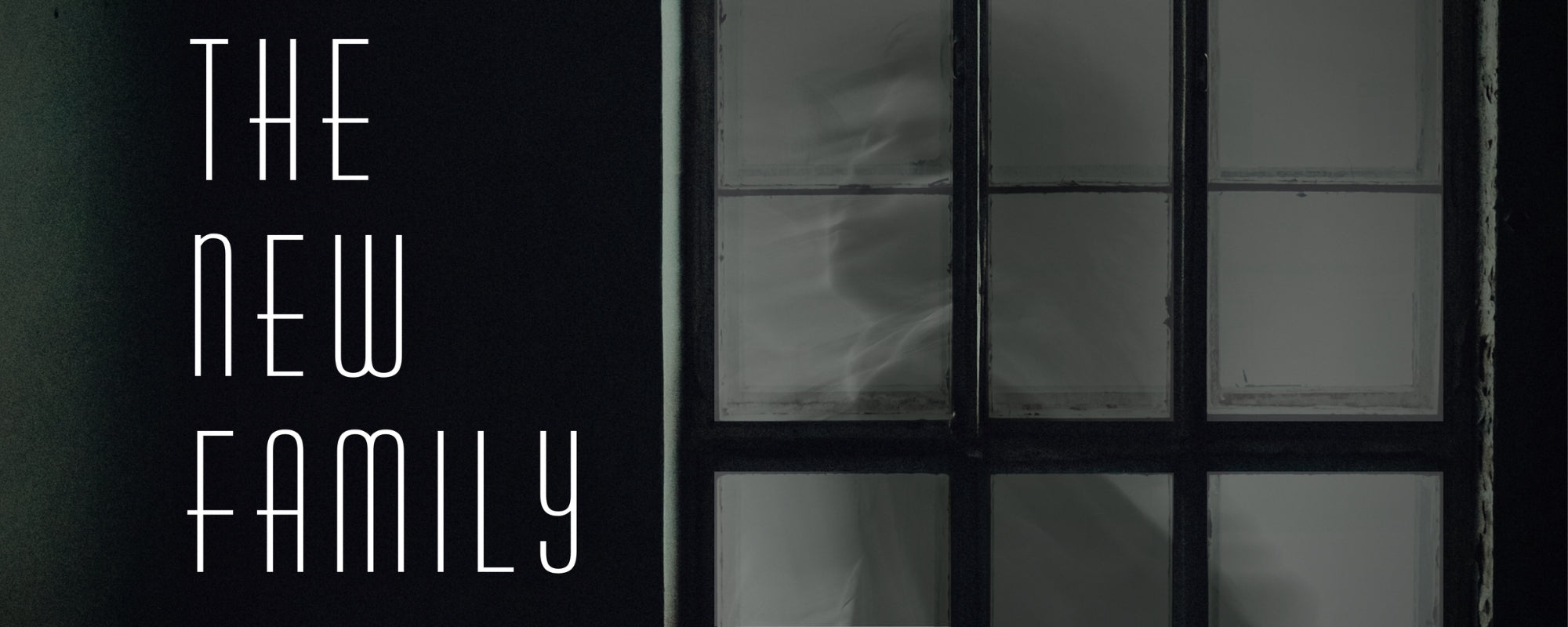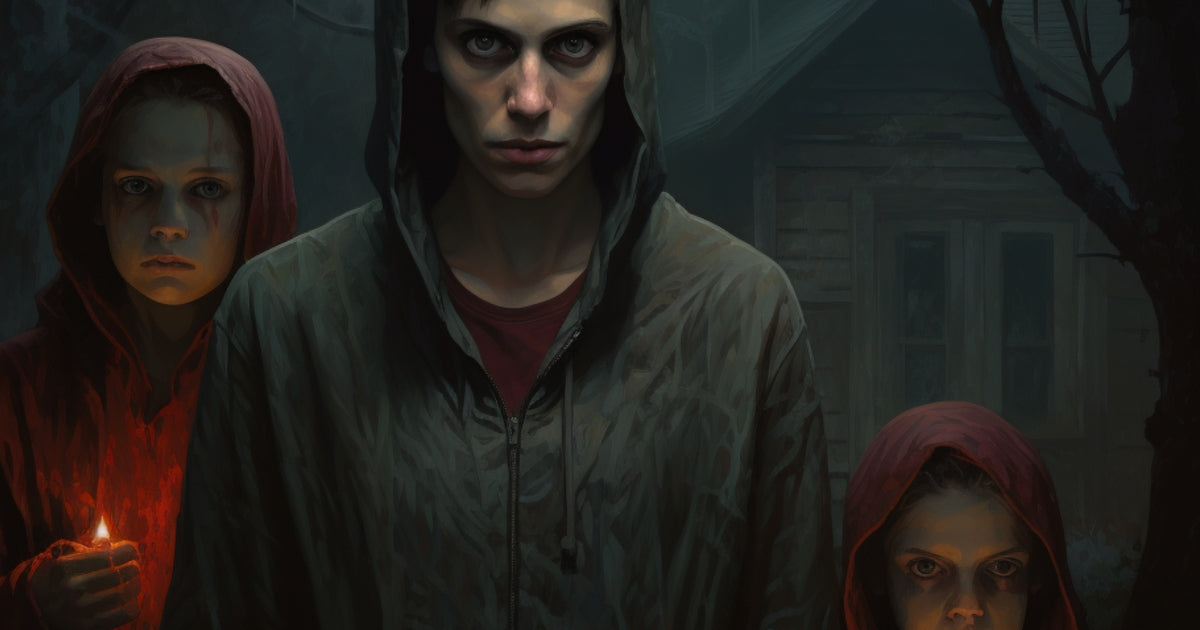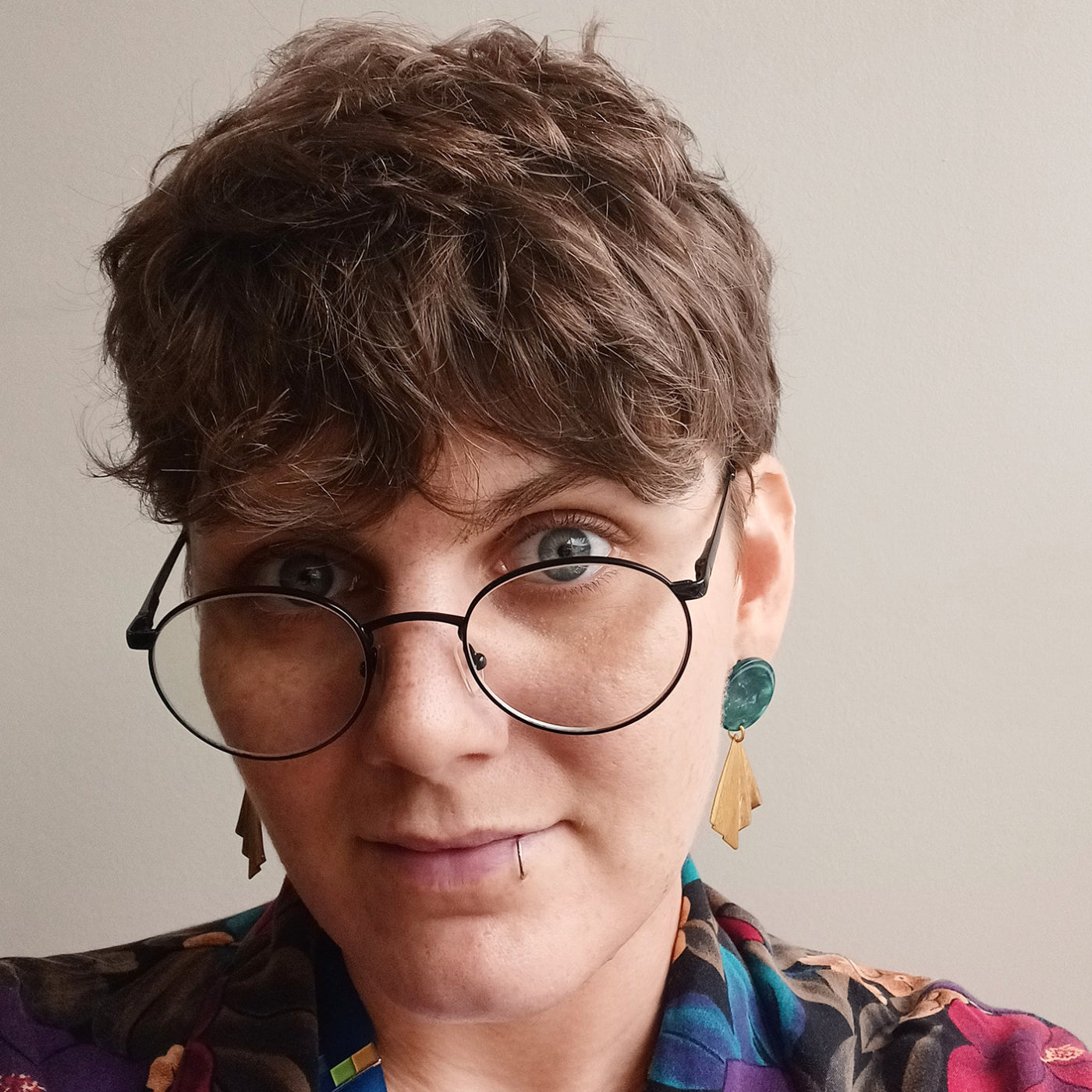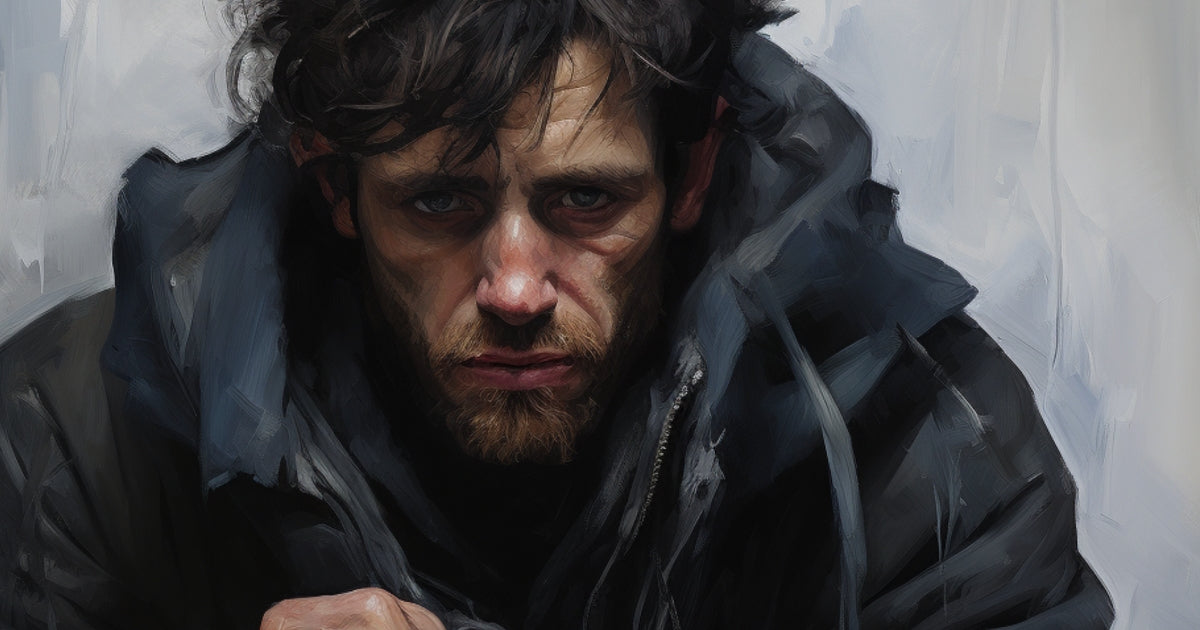

The New Family
By Elliott Gish
Through windows and over fences we watched the new family arrive on a bright, cold autumn morning. A convoy of moving vans slowly followed the family’s unwashed gray car up the street, inch by uncertain inch, until coming to rest in front of the blue house with the deep and shady porch: 14 Englund Street. The house where the Weirs used to live, and the Eldridges, and the Samsons, and the Merrilands.
We remembered the sounds that had come before, the screaming in the middle of the night, the blood. We closed our curtains, turned our attention back to our own yards. We did not want to see.
And yet, as the day moved on, we were drawn again and again to our windows and doors, staring at the family on the front lawn. Three of them, clustered around the FOR SALE sign that did not stir in the wind. A mother, plump and harassed-looking, with red hair that had not yet begun to fade. A teenage daughter—this made our frowns deepen considerably—beautiful in a coltish kind of way, all wide eyes and sun-kissed skin. A son, towheaded and pink-cheeked, whose age we could not place. He could have been as young as six. He could have been as old as nine. No father that we could see.
We could piece together the story from the off-brand sneakers they wore, the self-conscious shabbiness of the furniture the movers hauled over the threshold of the blue house. This was not a family with a lot of money. A single mother, two children. Probably, we thought, they had never owned a house before. Probably the mother had been ecstatic to find one so cheap, so beautiful, in such a nice part of town. With that kind of luck, you don’t ask your realtor too many questions about why the house is for sale in the first place, why the owners left. You don’t think about it. You just sign.
That was what had happened to the other families.
🏡
After three days, we knew who they were. Adler was the surname. Terri was the mother. She was a nurse at the local hospital, away for long hours at a time. Always a little bit tired and a little bit overwhelmed, but with a sweet smile and a raucous laugh. Lauren was the daughter. She played the violin—she always kept her window open, so we could hear her—and loved animals, would run to pet our dogs if she saw them walking by. Ewan was the son. Quiet, solemn, unnaturally cherubic. He sat on the front lawn every day and watched us as we watched him. His round blue eyes seemed to pierce through the walls of our houses, follow us to bed at night. He peered into our faces when we walked by. He looked into our dreams.
We shared this information in hushed phone calls and stolen whispers, in furtive texts and in a messenger group someone tech-savvy had set up called RE: BLUE HOUSE. It was no good, we all agreed, a family like that in that house. A mother gone for long hours, a girl on the cusp of womanhood, a child with those watchful eyes. In that house, it could only lead to trouble.
Remember the Merrilands, we told each other, the father dragging the bodies of his three children over the threshold of the blue house, arranging them all on the lawn to form a lopsided triangle. Try not to talk to them. Try not to look at them. If they throw a housewarming party, politely decline. We could not get attached. We’d learned that much.
🏡
The Adlers did throw a housewarming party. Despite what we had discussed in our secret chats, the whole neighborhood attended, all of us trying to look around the blue house and ascertain what changes the new family had made, while simultaneously avoiding each other’s eyes. Our gazes fixed on the walls and the ceilings, we held warmish glasses of white wine and ate vegetables with store-bought ranch.
They hadn’t changed much. The fresh paint, hastily applied after the last family, hadn’t been touched yet, and the whole house was a pleasant and uniform beige. The ceiling had been repaired, the door to the cellar replaced with something stronger and sterner. The deep scratches in the wood floors, as from sets of dragging fingernails, had disappeared. Here and there the Adlers had hung pictures, put up shelves and filled them with framed photographs and crystal tchotchkes, but there was an empty feeling to the house, one we recognized from every other time we had been there to welcome a family to the neighborhood.
We saw little of the daughter during this party, although we could hear her moving about in her room upstairs. The mother was in constant motion, always disappearing to the kitchen for more food, another bottle of wine, a fresh bowl of dip. The son sat silent behind the frayed brown sofa, only occasionally rising to peek over the edge.
“The house is watching,” he said to one of us. It might have been the yoga instructor from the house with green shutters. It might have been the accountant from the bungalow. He said it without blinking those round blue eyes, and we remembered the little girl from the Samson family. How she had stood on the porch, with her back to the street, and watched the white lights flash through the windows of the house, listened to her parents screaming inside. When the police finally arrived on the scene, she did not say a word as they loaded her into their car. She just stared, as though what she had seen had burned itself into the air in front of her.
We compared notes later, but the only unusual thing that seemed to happen that evening was the slight, independent movement of a crystal tumbler on a side table. When the podiatrist and her wife from the house with the green fence started walking down the street and looked back at the Adler residence, they claimed they saw a white light flash in one of the upstairs windows, but that, we all agreed, could have been Lauren, flicking a switch out of boredom.
We all went to bed that night thinking of the Samson girl. The accountant had tracked her down, with great difficulty, to a group home for troubled children in the next county. She had not spoken since the incident. At one point, we were told, she had tried to remove her own tongue with pliers.
🏡
We knew how it would go. First the child, then the teen, then the mother would be affected, and then it would all go to hell. It was a well-worn plot for us at this point, but one we breathlessly followed nevertheless.
As a group, we kept a careful eye on the Adlers. We watched them through their windows as they sat down for hurried and comfortable breakfasts, burped and laughed and argued and brushed their teeth. We bore witness to their family movie nights every Thursday, all three of them crowded onto a sofa in the den and eating popcorn. We observed Lauren play with Ewan in the backyard while Terri napped inside, worn out from yet another double shift.
It is said that observation changes the observed. We did not know if that was so, if by watching the family we could change the outcome of the situation. But we did it anyway.
It was through this constant observation that we witnessed the first incident. The restaurant owner who lived behind the blue house had taken to looking through the windows from her kitchen through a pair of binoculars. This gave her an excellent view of Lauren’s room in particular, and she would often see the girl standing in silhouette against the window, playing her violin. The restaurant owner was watching the girl do just that one night when, suddenly, Lauren frowned, faltered, lowered her bow. She looked around, as though she’d heard a sound and couldn’t place it.
The restaurant owner told us that the girl stood there for a full minute, clutching her bow as though intending to wield it like a weapon. Nothing happened, and slowly, slowly, the tension leaked from her shoulders. She raised her hand to play again.
As though grabbed by an invisible hand, the girl went flying backwards into her bedroom door, striking it hard enough to knock the pictures off the wall. The restaurant owner described her face, her mouth distended in a scream that none of us heard, her arms flung up to ward off her unseen attacker. As she slumped down onto the floor, Terri crashed into the bedroom, her face a contortion of maternal fear.
Here we go, we said to one another, in person and though text, online, and on the phone. Give it another week, and the FOR SALE sign will go up again.
We wondered what it would do this time, how it would destroy them. Traded theories, floated hypotheses. One or two of us even made bets. It sounds cruel, but we were used to the cycle of the blue house by then. When you are forced to accept a cruel reality, you either become cruel in response, or you die.
We did not want to die. We had seen enough of death to know that.
🏡
For several weeks, nothing happened except this: Ewan started digging a hole.
It was on the front lawn, right in the middle, not far from where the post of the FOR SALE sign had been driven into the dirt. This intrigued us. No one had ever started digging before. We thought at first that this new game might get Ewan in trouble, and we waited for the inevitable fallout of discovery, but then the yoga instructor walked past the blue house in the cold, pale hours of early morning one day and saw Terri standing on the front porch with a cup of coffee, watching her son dig. He used a garden trowel, methodically shoveling tiny mounds of dirt onto the grass.
“Careful with that, sweetie,” the yoga instructor heard Terri say to Ewan, but without much interest in her voice. She was watching him, the yoga instructor told us, as though sitting at a soccer game or swim meet. She looked distant, thinking perhaps about the upcoming workday, the laundry that would need to be done when she got home from the hospital.
Lauren came out onto the porch to join her mother, holding her own cup of coffee. The two of them watched the boy dig, saying nothing to each other. The windows behind them flickered with white, as though individual rooms were being struck by lightning. At first the yoga instructor thought that the Adlers did not notice the lights, but then Lauren turned and watched them, her eyes following the light as they moved from one window to the next.
“They’re doing it again,” the yoga instructor said she heard the girl say, and swore that Terri said in response, “Good.”
We remembered the teenage boy from the Eldridge family, how he’d run into the street naked and bloody in the dead of winter, screaming that he could hear voices in the lights. The house was speaking to him in a language only he could understand, a sacred tongue from before the fall of the Tower of Babel. “God is good!” he’d howled. “God is good, and God loves this house, He loves it,” over and over, tearing at his hair and his skin and at the place where his genitals had been, where there was nothing now but a half inch of bloody stump. The lights had jumped merrily from window to window, as though echoing him.
We started to find excuses to visit the blue house. Suddenly, the professor in the yellow split-entry urgently needed to borrow a cup of sugar. The podiatrist and her wife came over with a fresh pecan pie. The man who owned the refrigeration company knocked and said that he had a son about Ewan’s age who wanted to play with him, could he send him over?
This was a lie. The man who owned the refrigeration company did not have a son, and even if he had, the child would not have wanted to come and play. They knew all about the blue house, had seen it have its way with family after family. They would not ride past on their bicycles, and they crossed the street whenever they walked by so as to keep as much distance as possible between their bodies and the door.
The Adlers met us at the door, friendly and warm, but did not invite us in. They would speak to us in passing on the street or at the mailboxes, but any questions about the house, however delicately put, they would cordially deflect. They began to keep their curtains drawn, so that we could only see the moving lights through a haze of lace or muslin. Noises came from inside the house, crashes and bangs, the shimmer song of breaking glass, the dissonant sound of a violin being played by something that did not know how to play it. Once, briefly, the accountant heard someone crying when he walked by with his dog, but when he stopped to listen, the sound cut off as abruptly as though a door had been slammed shut.
“Good,” Terri had said when Lauren mentioned the lights, and we puzzled over that as Ewan’s hole grew wider and wider, deeper and deeper, until it began to swallow the entire front lawn. The Eldridge boy’s mouth had looked like that when they came to take away his body, frozen stiff in an attitude of worship and supplication. He had died with his eyes on the house, full of tears. The snow beneath him had been the loveliest shade of crimson.
🏡
None of us knew about Ewan’s birthday party until three nights before. Ewan himself went from door to door, one invitation for each house in the neighborhood, inviting whole families to attend. The invitations had robots on them, and blue stars made of glittering foil. It was clear from the uneven letters that he had written them out himself.
“I hope you can come,” he said at each house, a fact that we verified with one another through our various methods of communication. The thought of another gathering in the blue house was exciting to us. We were impatient to see what the house had been up to, what signs we could read in its rooms and walls that would tell us about the lives that were lived inside of it. What was the house doing to the Adlers? Were they to have the same fate as the Merrilands, the Samsons, the Eldridges? Were they, God help them, going to go the same way as the Weirs? We were sure that we would know as soon as we stepped inside. So, we dressed in our best and forced our terrified children into their least comfortable shoes and descended upon the blue house.
How disappointed we were when we arrived en masse and learned that there was to be no admittance into the house itself! Ewan’s party was held in the backyard, plastic tables laden with bags of chips and cans of pop and plates of sticky-sweet desserts growing too warm under the unseasonably fierce rays of the fall sun. Even when the teacher from the house with the blue door faked a sudden IBS flareup and asked to use the washroom, Terri refused to let her in.
“I haven’t had time to clean,” she said, and we all noticed how fresh she looked, how bright. Her hair was glossier now than it had been when she’d first appeared on the lawn, her skin brighter, a hint of roses in her cheeks. Lauren, too, seemed better, prettier, more vivacious, the little red mark on her neck from her violin noticeably faded. Only Ewan looked worse for wear, paler and thinner than he had been, his little hands stained with dirt.
We adults crowded at the edges of the yard, sulky and defeated, half-heartedly watching our children play. They did so cautiously at first, casting fearful glances up at the looming blue house, but as the afternoon wore on, they began to lose their fear, began to run around, eat snacks, even shout. By the time Terri brought out the birthday cake, they all seemed perfectly at ease.
All except Ewan. His leg jittered frantically as he watched his mother cut the cake, and his hands shook as he reached out to accept the piece she handed him. Several of us saw him pick at it with his fork, raising tiny bites to his mouth and then letting them fall without ever touching his lips. At one point, the teacher from the house with the blue door said later, he came up to her and tugged on the sleeve of her cardigan.
“The house is watching,” he told her, just as he’d said at the first party weeks before, and the teacher saw an opportunity.
“If the house is watching me,” she said to him, “shouldn’t I go inside of it? To give it a better look at me?”
She was very pleased with herself for this bit of quick thinking, but Ewan only shook his head.
“It can see you fine from here,” he said, and pointed up to the windows, all their curtains drawn tightly closed. Through the fabric, she said, she saw the white lights flickering, although no one else did that afternoon, and some of us suspect that she was lying. But the other thing she said she felt—that as she looked at the blue house, it looked right back at her—we all felt. Those blinded windows seemed to follow our every move, grim and disapproving. It did not think much of us, we rubberneckers, returning time and again to watch the house chew up families and spit them out. Like the Weirs. The poor Weirs.
We don’t know when the children started disappearing. Our eyes, all afternoon, were on the house. The sound of our sons and daughters playing was merely the background noise to the drama we followed amongst ourselves, a score we could easily tune out. It wasn’t until the yoga instructor decided to leave early and looked up to call her daughter that she realized the yard was almost empty. Just one child, being led away by Ewan, through the gate and into the front yard, the front lawn. The hole.
It was all the yoga instructor could see, she said later, that hole stretching wide as a mouth across the green lawn, a great wound in the flesh of the earth.
We all looked up at her howl of anguish, watched in astonishment as she ran after Ewan; and then we looked around, as though coming out of some strange trance, to see that our own children were gone as well. As one entity, we turned to look at Terri and Lauren, both of them sitting on plastic lawn chairs, looking for all the world like they were enjoying the party. Terri raised her eyebrows at us, smiled. Lauren looked almost apologetic.
“We know what it wants,” she said. “None of the other families ever figured it out, but we know. Sorry. We didn’t want to end up like the Weirs.”
Her last word was swallowed in the sound of many bodies rushing to the gate. On the front lawn we found Ewan, pale and exhausted, lying back in the grass as though he had been utterly drained by some unseen leech. By the edge of the hole, the yoga instructor knelt, keening, her fingers digging into the dirt. There were tears in her eyes and in her voice, but none streamed down her cheeks. They simply welled to the edges of her eyelids and stayed there.
“The hole!” she wailed. “He put her down there! I saw him push her! She’s gone! They’re all gone!”
All of us crowded around the edge of the hole and peered in. We could see nothing, hear nothing, from its depths. The podiatrist’s wife hesitantly offered to jump in and explore, but a plastic fork dropped over the edge fell and disappeared without a sound. We waited to hear it hit the ground. It didn’t.
Terri and Lauren came around from the backyard. Terri leaned down and picked up her son, cradling his small body in her strong arms. Stepping backwards onto the front step of the blue house, she said:
“You all could have given us a little bit of warning, you know. But you chose not to. So we didn’t, either.”
She turned and disappeared into the house, leaving the door open to her daughter. Lauren stayed outside for another moment, watching us. One shoulder raised in a shrug.
“Sorry,” she said again, and followed her mother inside. The door of the blue house closed. We were left on the front lawn, staring into the abyss that had taken our children.
🏡
This neighborhood is quiet now. There are no children playing in the streets, no shouts of joy or rage over games played in cluttered rec rooms and scrubby backyards. We walk through our lives like people in a dream, waiting for the moment when we may open our eyes to a world more fair and less ugly than this one.
When you are forced to accept a cruel reality, you either become cruel in response, or you die. The Adlers did not want to die.
They live in the blue house still, all these years later. They have not aged a day, not even Ewan, who remains the size of a boy. We watch them come and go, Terri to work, the children to school, as commoners might watch royalty passing by—desperate for a feeling of kinship, of recognition, from those blessed with superior fortune. Their family, still intact, is an idol for us to worship, a fire at which we hope to warm our hands. We watch them, and the blue house watches us, white light flickering merrily behind its windows.
On the darkest nights, some of us think that we see our children in those windows, silhouetted against the curtains. They peer down at us from a place we cannot reach, their hands pressing against the glass, until the light flickers again and they disappear, leaving only greenish afterimages in their wake.
The house wanted them. But that was years ago. We do not know what it wants now.
The yoga instructor moved away last year, and the house with the green shutters has been sold three times. This current sale is the fourth. From our windows and our yards, we can see the new family on the lawn, waving down their moving van. Two men this time, a little daughter whose black hair sticks out on either side of her head. We can see Terri and Lauren and Ewan making their way over from the blue house, all smiles, all warmth. Terri shakes both of their hands. We can see her mouth moving, shaping words we cannot hear. But we know, all the same, what she is saying.
“Your little one should come over to play sometime.”
We should warn the men, tell them not to let their daughter go to the blue house. Give them the chance that we didn’t get.
But then, that hardly seems fair. Maybe we won’t.
Copyright © 2023 Elliott Gish
The Author

Elliott Gish
Continue reading

Get Issue Updates
Promotions, new products and sales. Directly to your inbox.



